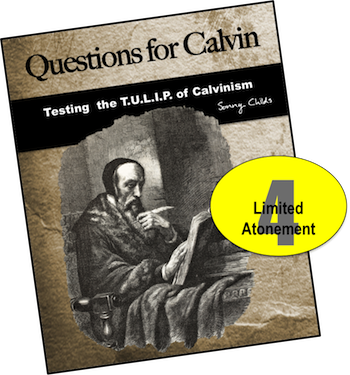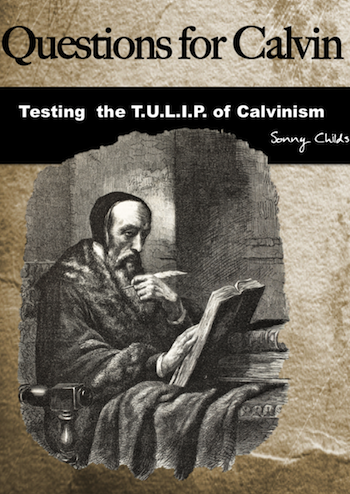Questions for Calvin: L is for Limited Atonement

Note: T.U.L.I.P. is an acronym often used to summarize the five core doctrines of Calvin, Total Depravity, Unconditional Election, Limited Atonement, Irresistible Grace, and Perseverance of the Saints.
In the Words of Calvin:
John Calvin (Institutes 2.5.3; Calvin 1960:320)
"Therefore, though all of us are by nature suffering from the same disease, only those whom it pleases the Lord to touch with his healing hand will get well. The others, whom he, in his righteous judgment, passes over, waste away in their own rottenness until they are consumed. There is no other reason why some persevere to the end, while others fall at the beginning of the course."
Calvin believed and taught that Jesus only died for a limited few. This doctrine is the natural offspring of the assumption made in the previous letter of the T.U.L.I.P., "Unconditional Election." If election and salvation mean the same thing, and God preselected the saved without their freewill, then it only stands to reason that He also predetermined to limit the redemptive power of Jesus. Why waste it on those who have no hope of salvation? In other words, because not everyone had the potential of being saved, God preordained that His Son's blood would only be effective for those He had preselected for salvation.
In the Words of God:
John 3:16-17 (NIV)
"For God so loved the world that he gave his one and only Son, that whoever believes in him shall not perish but have eternal life. For God did not send his Son into the world to condemn the world, but to save the world through him."
Q: If Limited Atonement means that Jesus only died for a select few, why did Jesus give such a beautiful declaration of God's universal love? Why mention the entire world three times if He really meant only a few within the world? Why use such a general term as "whoever" if He really meant "not everyone"? Why did Jesus qualify the most quoted verse in all the Bible with the words of verse 17, the explicit declaration, "God did not send his Son into the world to condemn the world, but to save the world"?
A: Please don't misunderstand, Jesus also said, "…small is the gate and narrow the road that leads to life, and only a few find it." (Matthew 7:14, NIV) But just because only "a few find it" that does not mean the road or the gate are unavailable to the rest. It simply means that only a few seek it and only a few make the freewill choice to accept their entrance within. Truly, the atonement of Jesus is limited, but not because God forces some to go to Hell. It is limited because the masses refuse to accept the Lord's atonement. Only by submitting to the harmony of these passages can the whole counsel of God be truly discovered.
2 Peter 3:8-9 (NIV)
"But do not forget this one thing, dear friends: With the Lord a day is like a thousand years, and a thousand years are like a day. The Lord is not slow in keeping his promise, as some understand slowness. Instead he is patient with you, not wanting anyone to perish, but everyone to come to repentance."
Q: If Limited Atonement means that Jesus only died for a select few, why present such a loving revelation of God being so patient that He doesn't want "anyone to perish"? Why say "anyone" if His Son's blood doesn't have the potential to cover all? Why use the word "everyone" if He really only meant a few? (Note: Some would argue that this verse is only addressing those who are already saved. Even if that is true, and given the context, I don’t believe it is, this passage clearly indicates that even the saved have the potential of losing their faith and perishing, completely contradicting the last letter in Calvin's T.U.L.I.P., "Perseverance of the Saints" or "Once Saved, Always Saved.")
A: Please don't misunderstand, Peter does go on to warn his readers, "…make every effort to be found spotless, blameless and at peace with him. Bear in mind that our Lord’s patience means salvation…." (2 Peter 3:14-15, NIV) Truly, the atonement of Jesus is limited, but it is limited only because some choose not to "make every effort." Notice also the last phrase of this passage, "…our Lord’s patience means salvation…." Salvation for whom? God is patient because He wants to give all of humanity sufficient opportunity to avail themselves of the unlimited atonement of His Son. Only by submitting to the harmony of these passages can the whole counsel of God be truly discovered.
Matthew 24:14 (NIV)
"And this gospel of the kingdom will be preached in the whole world as a testimony to all nations, and then the end will come."
Matthew 28:19 (NIV)
"Therefore go and make disciples of all nations, baptizing them in the name of the Father and of the Son and of the Holy Spirit…."
Mark 16:15-16 (NIV)
"He said to them, 'Go into all the world and preach the gospel to all creation. Whoever believes and is baptized will be saved, but whoever does not believe will be condemned.'"
Colossians 1:23 (NIV)
"This is the gospel that you heard and that has been proclaimed to every creature under heaven, and of which I, Paul, have become a servant."
Q: If Limited Atonement means that Jesus only died for a select few, why place such a heavy emphasis on "the whole world," "all nations," "all the world," "all creation" and "every creature under heaven"? I would also ask that you give specific attention to Matthew 24:14 and the phrase "as a testimony to all nations." What is the purpose of the "testimony" if it is not to offer unlimited atonement to "all nations"?
A: Please don't misunderstand, Jesus also warned, "Not everyone who says to me, ‘Lord, Lord,’ will enter the kingdom of heaven, but only the one who does the will of my Father who is in heaven." (Matthew 7:21, NIV) Truly, the atonement of Jesus is limited, but it is only limited by those who refuse to do the will of the "Father who is in heaven." Unlike the doctrines of Calvinism, the Holy Spirit teaches that atonement is available to "the whole world," "all nations," "all the world," "all creation" and "every creature under heaven." Only by submitting to the harmony of these passages can the whole counsel of God be truly discovered.
Additional Passages for Further Study:
1 Timothy 2:3-6
(NIV)
"This is
good, and pleases God our Savior, who wants all people to be saved and
to come to a knowledge of the truth. For there is one God and one mediator
between God and mankind, the man Christ Jesus, who gave himself as a ransom for
all people."
Titus 2:11 (NIV)
"For the
grace of God has appeared that offers
salvation to all people."
1 John 2:2 (NIV)
"He is the
atoning sacrifice for our sins, and not only for ours but also for the sins
of the whole world."
Application:

There can be little unity among Christians as long as human doctrines dominate and selective obedience governs hermeneutics (principles for interpreting Scripture). Only by submitting to the whole counsel of God can we correctly handle the word of truth. We must raise our sights higher than the teachings of men.
2 Timothy 2:15, NIV
“Do your best to present yourself to God as one approved, a worker who does not need to be ashamed and who correctly handles the word of truth.”
I firmly believe that two of the greatest challenges facing the church today are Islam from without and Calvinism from within. In a world so devoid of personal responsibility, Calvin's doctrine of grace without responsibility is truly alluring. Young people are deserting biblical truth in alarming numbers. These false doctrines have permeated nearly every Christian denomination and must be addressed.
This important material can be covered in a seminar, Gospel meeting or revival format. For more information about this presentation, please visit our "Questions for Calvin" seminar page. This material is also available as an ebook through Amazon, Barnes & Noble and other formats. (Go to the "Books by Sonny" page for links to the other formats.)
Our children are at risk. It is my greatest prayer that you will find this information helpful in defending them against the false teachings of Calvinism.
Missed the first three lessons in this series? Go to:
Questions for Calvin: "Introduction"
"T is for Total Depravity"
"U is for Unconditional Election"
Want to continue this series? Go to:
Questions for Calvin: "I is for Irresistible Grace"
"P is for Perseverance of the Saints"
"Conclusion"
Back to Top of "Questions for Calvin"
Back to The Church Page
Back to Home Page


